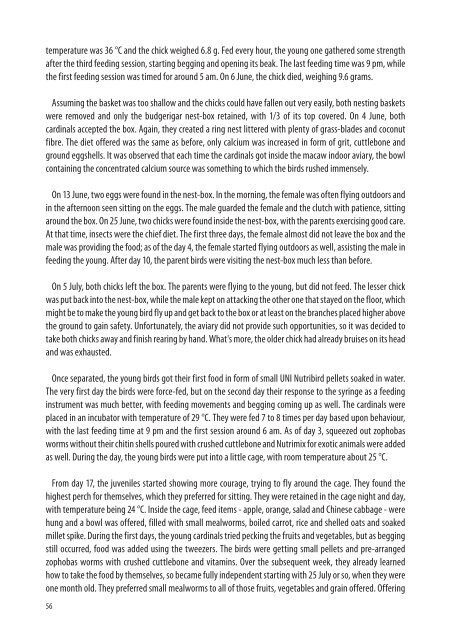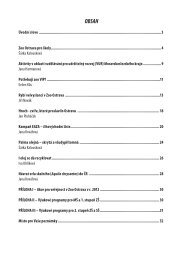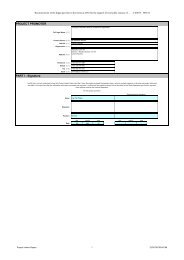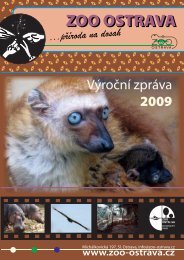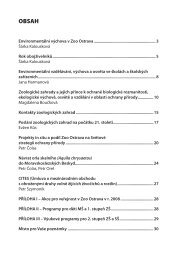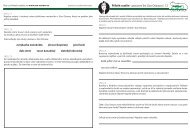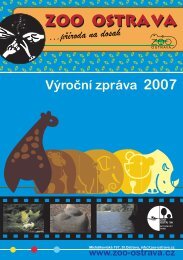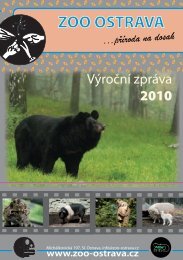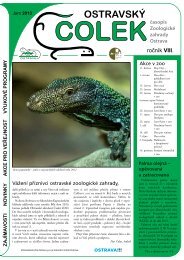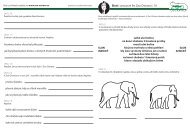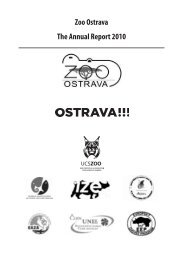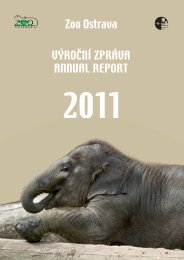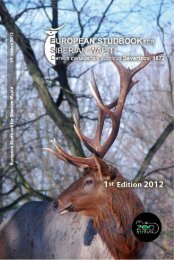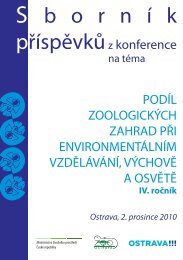You also want an ePaper? Increase the reach of your titles
YUMPU automatically turns print PDFs into web optimized ePapers that Google loves.
temperature was 36 °C and the chick weighed 6.8 g. Fed every hour, the young one gathered some strength<br />
after the third feeding session, starting begging and opening its beak. <strong>The</strong> last feeding time was 9 pm, while<br />
the first feeding session was timed for around 5 am. On 6 June, the chick died, weighing 9.6 grams.<br />
Assuming the basket was too shallow and the chicks could have fallen out very easily, both nesting baskets<br />
were removed and only the budgerigar nest-box retained, with 1/3 of its top covered. On 4 June, both<br />
cardinals accepted the box. Again, they created a ring nest littered with plenty of grass-blades and coconut<br />
fibre. <strong>The</strong> diet offered was the same as before, only calcium was increased in form of grit, cuttlebone and<br />
ground eggshells. It was observed that each time the cardinals got inside the macaw indoor aviary, the bowl<br />
containing the concentrated calcium source was something to which the birds rushed immensely.<br />
On 13 June, two eggs were found in the nest-box. In the morning, the female was often flying outdoors and<br />
in the afternoon seen sitting on the eggs. <strong>The</strong> male guarded the female and the clutch with patience, sitting<br />
around the box. On 25 June, two chicks were found inside the nest-box, with the parents exercising good care.<br />
At that time, insects were the chief diet. <strong>The</strong> first three days, the female almost did not leave the box and the<br />
male was providing the food; as of the day 4, the female started flying outdoors as well, assisting the male in<br />
feeding the young. After day 10, the parent birds were visiting the nest-box much less than before.<br />
On 5 July, both chicks left the box. <strong>The</strong> parents were flying to the young, but did not feed. <strong>The</strong> lesser chick<br />
was put back into the nest-box, while the male kept on attacking the other one that stayed on the floor, which<br />
might be to make the young bird fly up and get back to the box or at least on the branches placed higher above<br />
the ground to gain safety. Unfortunately, the aviary did not provide such opportunities, so it was decided to<br />
take both chicks away and finish rearing by hand. What's more, the older chick had already bruises on its head<br />
and was exhausted.<br />
Once separated, the young birds got their first food in form of small UNI Nutribird pellets soaked in water.<br />
<strong>The</strong> very first day the birds were force-fed, but on the second day their response to the syringe as a feeding<br />
instrument was much better, with feeding movements and begging coming up as well. <strong>The</strong> cardinals were<br />
placed in an incubator with temperature of 29 °C. <strong>The</strong>y were fed 7 to 8 times per day based upon behaviour,<br />
with the last feeding time at 9 pm and the first session around 6 am. As of day 3, squeezed out zophobas<br />
worms without their chitin shells poured with crushed cuttlebone and Nutrimix for exotic animals were added<br />
as well. During the day, the young birds were put into a little cage, with room temperature about 25 °C.<br />
From day 17, the juveniles started showing more courage, trying to fly around the cage. <strong>The</strong>y found the<br />
highest perch for themselves, which they preferred for sitting. <strong>The</strong>y were retained in the cage night and day,<br />
with temperature being 24 °C. Inside the cage, feed items - apple, orange, salad and Chinese cabbage - were<br />
hung and a bowl was offered, filled with small mealworms, boiled carrot, rice and shelled oats and soaked<br />
millet spike. During the first days, the young cardinals tried pecking the fruits and vegetables, but as begging<br />
still occurred, food was added using the tweezers. <strong>The</strong> birds were getting small pellets and pre-arranged<br />
zophobas worms with crushed cuttlebone and vitamins. Over the subsequent week, they already learned<br />
how to take the food by themselves, so became fully independent starting with 25 July or so, when they were<br />
one month old. <strong>The</strong>y preferred small mealworms to all of those fruits, vegetables and grain offered. Offering<br />
56


